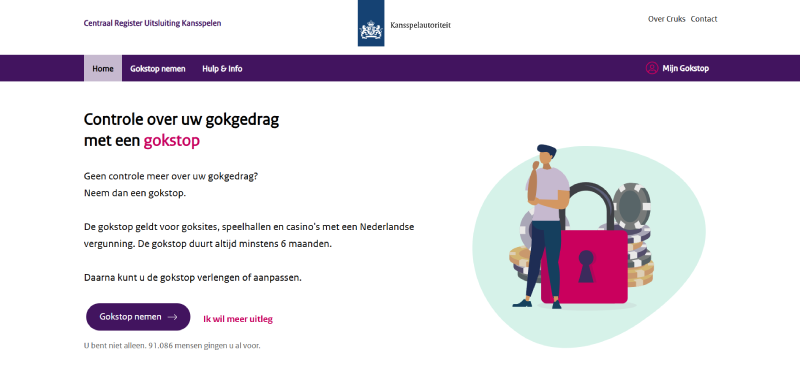Zoek je naar onbegrensde vrijheid en gemak bij online casino’s zonder CRUKS? Met internationale aanbieders profiteer je van snelle stortingen, flinke bonussen en meer privacy.
Beste casino’s zonder CRUKS van 2025 
- Opnametijd: 0-1 uur
- Stortingslimieten: €10 - €100.000
- Zonder CRUKS: Ja
- Opnametijd: 0-2 uur
- Stortingslimieten: €10 - €100.000
- Zonder CRUKS: Ja
- Opnametijd: 0-2 uur
- Stortingslimieten: €10 - €100.000
- Zonder CRUKS: Ja
- Opnametijd: 0-3 uur
- Stortingslimieten: €10 - €100.000
- Zonder CRUKS: Ja
- Opnametijd: 0-3 uur
- Stortingslimieten: €10 - €100.000
- Zonder CRUKS: Ja
- Opnametijd: 0-3 uur
- Stortingslimieten: €20 - €100,000
- Zonder CRUKS: Ja
- Opnametijd: 0-3 uur
- Stortingslimieten: €20 - €100.000
- Zonder CRUKS: Ja
- Opnametijd: 0-3 uur
- Stortingslimieten: €20 - €100.000
- Zonder CRUKS: Ja
Heb je zin om te spelen bij een casino zonder CRUKS en wil je weten welke aanbieders écht de moeite waard zijn? In onze lijst hieronder zie je wie er hoog scoren op spelaanbod, betrouwbaarheid en gebruikerservaring. Je krijgt meer privacy, vaak hogere bonussen en kunt meestal sneller je winst opnemen. Kies jouw favoriet en duik in een wereld van onvervalst speelplezier!
 NYXbets NYXbets | Beste casino zonder CRUKS in Nederland |
 BinoBet BinoBet | Beste mobiele casino zonder CRUKS |
 TrueLuck TrueLuck | Snelste casino uitbetalingen zonder CRUKS |
 Booms.Bet Booms.Bet | Beste live casino zonder CRUKS |
 GXbet GXbet | No-CRUKS casino met topbeloningen voor spelers |
Top 3 online casino’s zonder CRUKS van 2025
Ben je klaar om zorgeloos te gokken, zónder CRUKS? In ons overzicht voor 2025 vind je aanbieders met ruime bonussen, vlotte uitbetalingen en maximale privacy. Zo geniet je elke sessie van optimale vrijheid en kans op mooie winsten.
1. NYXbets: Razendsnelle uitbetalingen voor Nederlandse spelers

 Uitbetaling Uitbetaling | 0-1 uur |
 Online casino bonus Online casino bonus | €450 en 250 Free Spins + 25% Cashback |
 Zonder CRUKS? Zonder CRUKS? |  |
- NYXbets staat bekend om zijn no-CRUKS beleid en richt zich volledig op spelers die vrij willen gokken zonder verplichte registraties.
- De razendsnelle uitbetalingen zijn volgens ons de grootste troef van dit casino, want je ontvangt je winst vaak binnen enkele uren.
- Bij NYXbets profiteer je van een ruime welkomstbonus, periodieke reloadbonussen en een loyaliteitsprogramma, wat jouw vrijheid en fun alleen maar vergroot.
2. BinoBet: zorgeloos mobiel spelen waar je ook bent

 Uitbetaling Uitbetaling | 0-2 uur |
 Online casino bonus Online casino bonus | €1500 en 150 Free Spins + tot 20% Cashback & 15% Rakeback |
 Zonder CRUKS? Zonder CRUKS? |  |
- BinoBet profileert zich als de ultieme keuze voor vrij gokken, zonder CRUKS en met een soepele mobiele speelervaring.
- Deze aanbieder blinkt uit in gebruiksgemak en snelle laadtijden op smartphones, wat je overal laat doorspelen zonder hinder.
- Met BinoBet krijg je toegang tot algemene bonusacties, een aantrekkelijke welkomstbonus en periodieke cashbacks voor nog meer flexibiliteit.
3. TrueLuck: focus op snelheid en simpelheid

 Uitbetaling Uitbetaling | 0-2 uur |
 Online casino bonus Online casino bonus | €4000 en 175 Free Spins + tot 15% Cashback |
 Zonder CRUKS? Zonder CRUKS? |  |
- TrueLuck zet volop in op no-CRUKS spelen en is ideaal als je snel wilt storten en uitbetalen zonder papierwerk.
- De belangrijkste troef is de snelle uitbetaling, waardoor je vrijwel meteen over je winst kunt beschikken en kunt genieten van je opbrengsten.
- TrueLuck biedt een standaard welkomstbonus, aanvullende promoties en regelmatige toernooien om je adrenaline op peil te houden.
Wat is CRUKS?

CRUKS staat voor het Centraal Register Uitsluiting Kansspelen, een systeem dat door de Nederlandse kansspelautoriteit is opgezet. Het geldt voor binnenlandse casino’s met een KSA-vergunning en dient om spelers te beschermen die te veel risico lopen op gokverslaving.
Zodra je bent opgenomen in CRUKS, mag je niet meer spelen in casino’s met een Nederlandse licentie. De bedoeling is dat kwetsbare spelers extra begeleiding en pauze krijgen. Veel mensen kiezen echter voor casino’s zonder CRUKS om hun speelvrijheid en privacy te behouden.
Bij casino’s zonder CRUKS kun je sneller registreren en direct spelen, zonder dat je beperkt wordt door een nationale uitsluiting.
Hoe werkt een casino zonder CRUKS?
Spelen bij een casino zonder CRUKS betekent dat je geen verplichte inschrijving bij het Nederlandse register hoeft te doorlopen. Dit geeft je meer mogelijkheden om je eigen keuzes te maken.
- Geen CRUKS controle:
Je hoeft geen documenten of registraties van CRUKS te doorlopen, zodat je direct kunt beginnen met spelen. Deze vrijheid wordt gewaardeerd door spelers die liever zelf hun gokgedrag beheersen in plaats van zich te houden aan strikte regels.
- Meer privacy:
Een casino zonder CRUKS vraagt meestal minder gevoelige informatie tijdens het aanmeldproces. Daardoor behouden veel spelers graag de controle over hun gegevens, wat bijdraagt aan een veilige en anonieme speelervaring die je niet snel bij Nederlandse sites vindt.
- Vrijere spelomgeving:
Doordat er geen verplichte CRUKS-check is, ervaar je minder restricties tijdens het inzetten en ben je vrijer in je speellimieten. Dit kan bijvoorbeeld prettig zijn voor ervaren gokkers die graag op hun eigen voorwaarden spelen en hun eigen risico bepalen.
- Simpele aanmelding:
Bij casino’s zonder CRUKS verloopt het registratieproces doorgaans snel: je vult basisinformatie in, kiest een wachtwoord en kunt vrijwel direct beginnen. Deze straightforward aanpak is ideaal als je geen zin hebt in ellenlange formulieren of ID-checks.
- Buitenlandse vergunning:
Veel casino’s zonder CRUKS bezitten een licentie uit landen zoals Malta, Curaçao of Kahnawake. Ondanks dat deze vergunningen niet door de Nederlandse autoriteit worden verstrekt, hanteren ze vaak strenge regels rond verantwoord spelen, eerlijke games en beveiliging van betalingen.
- Snellere en modernere betaalopties:
Je vindt hier betaalmethoden die in Nederland misschien nog niet zo bekend zijn, maar wel snel en efficiënt werken. Voorbeelden zijn cryptobetalingen, alternatieve e-wallets of internationale overschrijvingen die je bij veel binnenlandse aanbieders niet zomaar tegenkomt.
- Meer en hogere bonussen:
Door de minder strikte regelgeving in het buitenland, bieden casino’s zonder CRUKS vaak gul mogelijke bonussen. Denk aan hoge welkomstpakketten, regelmatige toernooien en exclusieve acties die anders in Nederland wellicht niet worden toegestaan door de Kansspelautoriteit.
- Groter en diverser spelaanbod:
In deze casino’s stuit je vaak op gokspellen van ontwikkelaars die op de Nederlandse markt niet actief zijn. Zo profiteer je van een unieke mix van klassieke slots, moderne videoslots, live tafels en innovatieve spelconcepten die je horizon verbreden.
Casino zonder CRUKS vs. casino met CRUKS
Veel spelers vragen zich af of een casino zonder CRUKS echt zo verschillend is van een Nederlands casino mét CRUKS. In de kern kun je dezelfde soorten spellen spelen, maar de grote verschillen zitten ‘m in privacy, bonusvoorwaarden en registratievereisten.
| Kenmerk | Casino met CRUKS | Casino zonder CRUKS |
|---|---|---|
| Licentie | Nederlandse KSA-vergunning | Malta, Curaçao, Kahnawake, enzovoort |
| Betaalmethoden | Beperkt door NL-regels | Ruimere opties, ook crypto of buitenlandse |
| Spelaanbod | Voornamelijk bekende providers | Grotere variatie, internationale ontwikkelaars |
| Bonussen | Vaak strak gereguleerd | Hoger, meer flexibiliteit |
| CRUKS-registratie | Verplicht (indien opgenomen) | Niet van toepassing |
| Uitbetaalsnelheid | Kan soms langer duren | Regelmatig razendsnel |
| Restricties | Meestal strengere limieten | Vrijer, speler beslist zelf |
Storten en spelen bij een casino zonder CRUKS
Wanneer je wil genieten van vrij gokken zonder CRUKS, kun je eenvoudig kiezen voor een aanbieder met een buitenlandse licentie. Het proces van aanmelding tot uitbetaling verloopt sneller dan bij Nederlandse casino’s. Zo kun je in slechts enkele stappen je account activeren en beginnen met spelen.
Stap 1: Kies een casino zonder CRUKS

We raden je aan om eerst onze top lijst van beste casino’s zonder CRUKS te bekijken. Vanuit onze ervaring doen deze aanbieders er alles aan om je een vlotte registratie en aantrekkelijke promoties te geven. Selecteer je favoriet en ga door naar het volgende stappenplan voor je eerste storting.
Stap 2: Maak een account aan

Klik op “Registreren” of “Maak een account aan” en vul de nodige gegevens in. Meestal vraag je alleen om je naam, e-mailadres en een wachtwoord. Je rondt dit in een paar minuten af en kunt vervolgens je accountactivering via een bevestigingsmail afronden.
Stap 3: Selecteer je betaalmethoden en stort

Ga naar de kassier-sectie en kies een betaalmethode die bij je past. Bij casino’s zonder CRUKS kun je vaak terecht met internationale e-wallets, creditcards, bankoverschrijvingen of zelfs cryptobetalingen. Stort je gewenste bedrag, zorg dat je saldo is aangevuld en ga naar de spellenlobby om te beginnen spelen.
Stap 4: Activeer je casino welkomstbonus

Om je speeltijd extra spannend te maken, kun je gebruikmaken van de welkomstbonus. Dit is meestal een combinatie van extra speeltegoed en soms free spins. Check de bonusvoorwaarden en activeer je aanbieding door een code in te voeren of door een vinkje aan te zetten tijdens je storting.
Stap 5: Speel en win!

Nu je saldo op orde is, kun je meteen je favoriete spellen openen. Geniet van slots, live tafelspellen, bingo of crash games en test je geluk. Kom je in de prijzen? Dan kun je eenvoudig je winst laten uitbetalen op dezelfde betaalmethode die je hebt gebruikt.
Voor- en nadelen van gokken zonder CRUKS
Speel je bij een casino zonder CRUKS, dan krijg je een wereld aan vrijheid en gemak, maar er zijn ook aandachtspunten. Hieronder vind je de belangrijkste pluspunten en enkele minpunten op een rij. Wees je hiervan bewust om zorgeloos te genieten.
Casino zonder CRUKS voordelen:
- Geen verplicht registratiesysteem
- Ruime internationale licenties en betaalmethoden
- Flexibel bonusaanbod
- Meer keuze uit spellen
- Snel en makkelijk beginnen
- Grotere kans op anonieme betalingen
Casino zonder CRUKS nadelen:
- Geen bescherming door CRUKS
- Mogelijk taalbarrière in klantenservice
Vergunningen van een casino zonder CRUKS

Niet alle casino’s zonder CRUKS zijn onbetrouwbaar. Sterker nog, veel van deze aanbieders hebben een vergunning uit Malta, Curaçao, Kahnawake of andere betrouwbare jurisdicties. Deze instanties stellen ook strikte eisen op het gebied van spelersbescherming, eerlijke software en de afhandeling van financiële transacties.
Hoewel ze niet aan de Nederlandse KSA-regels voldoen, zijn de wettelijke kaders vaak stevig genoeg om spelers goed te beschermen. Dit betekent dat je alsnog met een gerust hart kunt spelen, zolang je kiest voor gerenommeerde partijen die hun licentie serieus nemen.
Kies altijd een casino met een zichtbare en controleerbare vergunning om veilig en verantwoord te spelen.
Spelaanbod van casino’s zonder CRUKS

Een casino zonder CRUKS geeft je meestal toegang tot een brede waaier aan spellen, van klassieke fruitautomaten tot moderne live games. Hierdoor is de kans groter dat je iets vindt dat perfect bij je smaak aansluit.
- Slots:
Klassieke fruitkasten, moderne videoslots en progressieve jackpots vind je bij elk internationaal online casino. Deze automaten komen bovendien regelmatig uit nieuwe studio’s, wat zorgt voor spannende thema’s en innovatieve bonusrondes. Zo heb je nog meer variatie dan je in Nederlandse casino’s zou verwachten. - Tafelspellen:
Blackjack, roulette en baccarat blijven populaire keuzes onder spelers. Dankzij de buitenlandse licenties kun je vaak kiezen uit meerdere versies met verschillende inzetlimieten. Hierdoor is het makkelijk om een spel te vinden dat past bij jouw budget en speelniveau. - Crash games:
Crash games zijn dynamisch en bieden een extra adrenaline-boost. Je ziet een multiplier oplopen, en je bepaalt zelf wanneer je uitstapt. Het is een combinatie van lef en timing, en bij een casino zonder CRUKS kom je deze spellen regelmatig tegen. - Live casino:
Voor wie de ultieme casino-ervaring zoekt, zijn er live dealers en echte speeltafels. Je hebt interactie met croupiers en medespelers, wat de spanning flink opvoert. Deze sectie is vaak uitgebreider in een casino zonder CRUKS, met tal van varianten. - Bingo:
Bij sommige internationale aanbieders kun je meedoen aan gezellige bingorooms die rond de klok draaien. Je tikt getallen weg van je kaart en maakt kans op kleine en grote prijzen. Deze sociale insteek voegt een ontspannen sfeer toe aan je spelsessies. - Wedden op sport:
Ben je meer fan van sportweddenschappen? Ook dan vind je bij veel casino’s zonder CRUKS een gevarieerd aanbod. Van voetbal en tennis tot eSports, je kunt inzetten op talloze competities. Dit maakt de beleving nog veelzijdiger en afwisselender.
Casino bonussen in casino’s zonder CRUKS

Bij een casino zonder CRUKS kom je vaak promoties tegen die in Nederland aan banden zijn gelegd. Denk aan royale welkomstpakketten die je speeltegoed verdubbelen, free spins op populaire slots, cashback-acties voor trouwe leden of zelfs toernooien met cashprijzen.
Deze bonussen zijn bedoeld om je interesse vast te houden en je bankroll te vergroten. Let wel op de voorwaarden, zoals inzetvereisten, geldigheidsduur en maximale winstlimieten. Zo haal je optimaal voordeel uit de extra aanbiedingen die buitenlandse casino’s te bieden hebben, zonder verrassingen achteraf.
Casino’s zonder CRUKS bieden vaak hogere bonussen en meer variatie dan Nederlandse aanbieders.
Betaalmethoden bij casino’s zonder CRUKS
Zonder CRUKS heb je doorgaans meer keuze om te storten en uit te betalen. Naast de bekende opties als creditcards en e-wallets, bieden buitenlandse casino’s vaak ook crypto-betalingen of minder gangbare diensten uit andere landen. Dit geeft je de kans om alternatieve, mogelijk snellere methoden te gebruiken.
Omdat de lokale regelgeving minder streng is dan in Nederland, kunnen deze casino’s een breder palet aan financiële diensten aanbieden. Hierdoor geniet je van een vlotte afhandeling van transacties en kun je direct door naar de spellen, zonder ingewikkelde controles.
Crypto-betalingen zijn snel en vaak zonder extra kosten, ideaal voor spelers die anoniem willen blijven.
Casino zonder CRUKS met iDEAL
Bij de meeste casino’s zonder CRUKS kun je niet direct met iDEAL betalen, omdat ze geen Nederlandse licentie hebben. Toch is hier een handige omweg voor. Via diensten als Volt, Yaspa of Brite kun je betalingen doen die vergelijkbaar zijn met iDEAL, of zelfs met iDEAL worden gefund. Hierdoor is het alsnog mogelijk om binnen een paar muisklikken saldo te storten en met je favoriete betaalmethode aan de slag te gaan.
Vijf tips voor verantwoord gokken zonder CRUKS
Spelen zonder CRUKS betekent niet dat je roekeloos aan de slag moet gaan. Hier zijn vijf tips om op een gezonde, prettige manier om te gaan met online gokken bij buitenlandse casino’s.
- Stel een speelbudget:
Begin met een vast bedrag per week of maand en houd je daaraan. Deze zelfopgelegde limiet zorgt ervoor dat je speelgedrag niet uit de hand loopt en helpt je om enkel met geld te spelen dat je kunt missen, zonder spijt. - Houd je speelduur in de gaten:
Zet timers of maak gebruik van speellimieten om te voorkomen dat je urenlang doorspeelt. Neem regelmatig pauze om even los te komen van het spel. Uit onze bevindingen blijkt dat korte pauzes helpen om met een frisse blik door te spelen. - Maak gebruik van casinohulpmiddelen:
Bij buitenlandse aanbieders vind je vaak ook hulpmiddelen voor verantwoord gokken, zoals realiteitchecks of limietinstellingen. Gebruik deze features op tijd, zodat je je speelgedrag onder controle houdt en niet voor vervelende verrassingen komt te staan. - Zie gokken als entertainment:
Bedenk dat online casino’s een vorm van vermaak zijn. Het is geen gegarandeerde manier om geld te verdienen. Wanneer je het ziet als een avondje uit en niet als een investering, blijft de ervaring leuk en onbezwaard. - Zoek hulp als het teveel wordt:
Bij signalen van problematisch gedrag is het slim om hulp te zoeken. Je kunt contact opnemen met professionele instellingen of gebruikmaken van zelfuitsluitingsopties die sommige casino’s bieden. Je gezondheid en welzijn gaan altijd boven welk spel dan ook.
Conclusie: Beste casino zonder CRUKS van Nederland
Speel je bij een casino zonder CRUKS, dan kies je voor meer vrijheid, aantrekkelijke bonussen en uitgebreide betaalopties—zonder de strikte Nederlandse controles. Dit geeft je de kans om op je eigen tempo te spelen en sneller uit te laten betalen.
Ook het spelaanbod is vaak groter en internationaal georiënteerd, wat zorgt voor extra variatie. Wil je dus zorgeloos genieten van online entertainment en optimale privacy? Ontdek onze aanbevolen aanbieders en vind jouw perfecte gokplek!
FAQ: Casino zonder CRUKS 2025
Een casino zonder CRUKS is een online aanbieder die geen gebruikmaakt van het Nederlandse Centraal Register Uitsluiting Kansspelen. Je kunt hier spelen zonder Nederlandse licentiecheck en verplichte inschrijvingen. Hierdoor ervaar je meer vrijheid en privacy, maar heb je ook minder bescherming vanuit de Nederlandse overheid.
Ja, casino’s zonder CRUKS kunnen gewoon legaal opereren, maar niet met een Nederlandse vergunning. Deze sites beschikken meestal over licenties uit landen als Malta, Curaçao of Kahnawake. Hoewel ze niet door de KSA gereguleerd worden, zijn veel van deze aanbieders nog steeds betrouwbaar en voldoen ze aan strenge eisen.
Uitschrijven uit CRUKS gebeurt via de officiële website van de Kansspelautoriteit of met hulp van klantenservice in Nederlandse casino’s. Zodra je bent uitgeschreven, kun je bij deze binnenlandse aanbieders weer inloggen. Wil je echter helemaal niet in CRUKS terechtkomen, dan kies je voor casino’s zonder Nederlandse licentie.
Kijk allereerst of er een gerenommeerde buitenlandse licentie is, zoals die van de Malta Gaming Authority of Curaçao eGaming. Lees ervaringen van andere spelers en check onze top 3-aanraders. Controleer ook de beveiliging van de website, het spelaanbod en de snelheid van uitbetalingen.
Het grootste voordeel is de toegenomen vrijheid, zonder verplichte controles of registratie in het Nederlandse systeem. Bovendien bieden casino’s zonder CRUKS vaak hogere bonussen, vlotte betaalmethoden en een breder spelaanbod. Zo ervaar je meer flexibiliteit en mogelijkheden dan bij strikt gereguleerde Nederlandse online casino’s.












